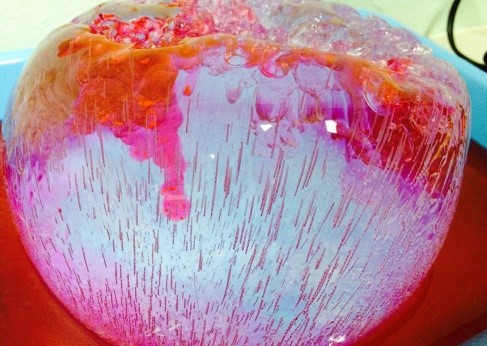คำถามทางวิทยาศาสตร์: จะฝึกนิสิตครูตั้งคำถามทางวิทยาศาสตร์ที่ดีได้อย่างไร
Main Article Content
Abstract
Artitaya Jituafua
รับบทความ: 8 เมษายน 2560; ยอมรับตีพิมพ์: 30 เมษายน 2561
บทคัดย่อ
คำถามทางวิทยาศาสตร์มีบทบาทสำคัญในการสืบเสาะทางวิทยาศาสตร์และการเรียนรู้อย่างมีความหมาย คำถามของผู้สอนจะเป็นสิ่งขับเคลื่อนกิจกรรมการเรียนรู้ในห้องเรียนที่นำไปสู่การสำรวจตรวจสอบจนกระทั่งพบคำตอบ หากนิสิตครูไม่สามารถตั้งคำถามทางวิทยาศาสตร์ที่ดีได้ด้วยตนเอง คงเป็นเรื่องยากหากการสืบเสาะทางวิทยาศาสตร์จะเกิดขึ้นในห้องเรียน และคงเป็นเรื่องยากหากจะพัฒนานักเรียนให้กลายเป็นผู้ตั้งคำถามทางวิทยาศาสตร์ได้ด้วยตนเองในอนาคต ดังนั้นบทความฉบับนี้ผู้เขียนจึงมุ่งนำเสนอลักษณะคำถามที่ดีทางวิทยาศาสตร์ ประเภทของคำถามทางวิทยาศาสตร์ที่นำไปสู่การสำรวจตรวจสอบได้ พร้อมทั้งตัวอย่างกิจกรรมส่งเสริมความสามารถในการตั้งคำถามทางวิทยาศาสตร์ของนิสิตครูวิทยาศาสตร์และยุทธวิธีพัฒนานิสิตครูในการตั้งคำถามทางวิทยาศาสตร์
คำสำคัญ: คำถามทางวิทยาศาสตร์ การตั้งคำถาม นิสิตครู
Abstract
Scientific questioning plays an important role on scientific inquiry and meaningful learning. Teacher's questions will drive learning activities in classroom that lead to scientific investigation until the answers are found. If pre–service teacher cannot pose a good scientific question by themselves, it would be difficult to appear scientific investigation in the classroom. It also would be difficult to develop students to become a good scientific questioner in the future. Therefore, this article focused on proposing of the good characteristics of scientific question and kind of scientific questions. In addition, the examples of activities that promote the pre–service teachers’ abilities and strategies to pose scientific questions were provided.
Keywords: Scientific question, Posing, Pre–service teacher
Downloads
Article Details

This work is licensed under a Creative Commons Attribution-NonCommercial 4.0 International License.
References
Ainscow, M. (2000). The next step for special education: Supporting the development of inclusive practices. British Journal of Special Education 27(2):76–80.
Chin, C. (2004). Students’ questions: Fostering a culture of inquisitiveness in science classrooms. School Science Review 86 (314): 107–112.
Chin, C. (2006). Classroom interaction in science: Teacher questioning and feedback to students’ responses. International Journal of Science Education 28(11): 1315–1346.
Chin, C., and Kayalvizhi, G. (2002). Posing problems for open investigations: What questions do pupils ask? Research in Science and Technological Education 20(2): 269–283.
Chin, C., and Osborne, J. (2008). Students’ questions: A potential resource for teaching and learning science. Studies in Science Education 44(1): 1–39.
Inquiring Mind Project. (2012). Promoting Ability to Ask Scientific Question. Retrieved from http://www.inquiringmind.in.th/archives/1554, March 9, 2017. (in Thai)
Institute for Inquiry. (2006). Raising Question (online). Retrieved from http://www.ex ploratorium.edu/ifi, January 19, 2017.
Krajcik, J., McNeill, K. L., and Reiser, B. J. (2008). Learning–goals–driven design model: Developing curriculum materials that align with national standards and incorporate project–based pedagogy. Science Education 92(1): 1–32.
Ladachart, L., and Ladachart, L. (2016). Fifth grade students’ questioning about science. Journal of Humanities and Social Sciences Mahasarakham University 35(1): 187–202. (in Thai)
Lederman, J. S., Lederman, N. G., Bartos, S. A., Bartels, S. L., Meyer, A. A., and Schwartz, R. S. (2014). Meaningful assessment of learners’ understandings about scientific inquiry – The views about scientific inquiry (VASI) Questionnaire. Journal of Research in Science Teaching 51(1): 65–83.
National Research Council [NRC]. (1996). National Science Education Standards. Washington, DC: The National Academies.
